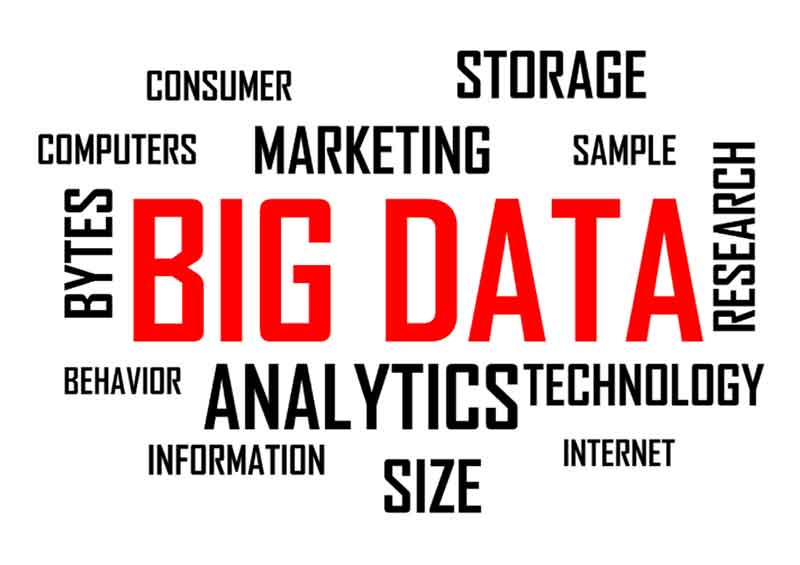With the influx of technological and AI-based computational processes, Big Data has revolutionized online trends and digital demographics. Twenty years back, who would have thought online businesses and e-commerce setups would be more successful than physical and land-based office spaces. The online digital space caters to about 2.1 million businesses across the US, comprising wholesalers and retailers from various industries. Since 2012, online companies have evolved significantly, contributing to digital assets and revenue generated through digital sales and marketing ventures.
Complicated structures, online patterns, user behavior, digital trends, and associations are classified as Big Data. Around the globe, thousands of individuals, known as Data Scientists, work at the back end of web pages and online platforms to deduce ongoing digital market and user-centered trends. While we enter any query on Google, billions of web pages and external links appear on your screen. The searched results result from a back-end algorithm, which simplifies Big Data and data patterns. Data sets and patterns which are too complicated and confusing to classify are channeled through various automated software to deduce conclusive results and patterns. To date about, 95% of the companies and online enterprises use Big Data to their advantage to determine ongoing market trends and consumer behavior. Big Data hasn’t just revolutionized online businesses but also had influenced individuals thinking and skill set.
Why and How Online Businesses and Digital Platforms Depend Upon Big Data?
Automated software and working algorithms have simplified complex tasks and data structures for online businesses and enterprises. In this highly digitalized and scientific world, online businesses need to understand consumer behavior and online market trends to create compelling marketing and sales strategies. Big Data is analytics of complex structures, which contemporary mathematical equations and individuals cannot perform. Many online classification tools and Big Data extractors are available online to help businesses and digital communities classify their online performances and user feedback.
To be the market leader, one needs to analyze and comprehend Big Data, depicting your user behavior, online market trends, and other digital demographics. Before launching any new brand or digital product, companies harness complex data structures to find out upcoming possibilities and user reactions. In simple words, Big Data assists enterprises and online communities produce market-oriented and user-friendly products that have greater acceptance and positive feedback.
According to the statistics of October 2021, about 4.88 billion individuals accessed the internet via different channels and applications. Individuals around the globe access the internet before making any purchase or selecting the best school and college for their children. Throughout the day, millions of users access the internet via social media applications and third-party platforms. As a user performs an online activity or operation online, it leaves behind a digital footprint that is recorded in complex data structures, as digital trends. Data Engineers and scientists analyze user behavior by proven automated methods and AI-based software to predict upcoming trends and influential dynamics.
Which Online Businesses Integrate and Use Big Data?
Around the globe, about 70% of companies and enterprises have shifted towards digitalized processes and automation. Whether it be E-commerce stores, listing websites, or online gaming platforms, they all use Big Data and data extraction tools to their advantage. Once a business has analyzed Big Data and comprehended user interests, it can easily dominate international and regional markets, attracting a greater pool of online users. The rate of online interactions directly impacts online sales and conversion rates. Mentioned below are 4 online business models that integrate and use Big Data to understand user behavior and upcoming market trends.
- E-commerce Stores
- Online Gaming Platforms
- Social Media Applications
- Digital Financial Platforms
E-Commerce Stores
According to a recent online market survey, about 1.3 million companies use e-commerce platforms in the US. Every brand needs an online marketplace to exhibit and market its flagship products to potential online buyers. Every 9 in 10 individuals searches for products online before purchasing land-based markets. Simplified Big Data structures help E-commerce giants create better marketing strategies, and sales funnel to catch the eye of online users. With Big Data, companies can produce and procure user-preferred and user-centered products that will likely attract thousands of online customers.
Online Gaming Platforms
About 2300 online gaming companies are operating across the 50 states of the US. Since the last decade, online casinos, betting platforms, and e-gamming platforms have attracted more than 96% of the Us’s population. Check these online casinos that use Big Data and automated techniques to develop a user-friendly online gaming environment, keeping online gaming authentic and viable. Big Data helps authorities in identifying decisive acts in the game. Moreover, big data analytics allows UI/UX designers and programmers to produce user-oriented designs, templates, games, and digital environments.
Social Media Applications
4.55 people across the globe use social media applications and platforms such as Facebook, Twitter, Instagram, Snapchat. Social media helps individuals stay connected and updated with ongoing current affairs and market developments. Social media platforms experience a high volume of users throughout the day, accessing various features and engaging on multiple posts. User footprints and digital prints are saved as Big Data, which are later analyzed and comprehended to understand user demands, behavior, expectations, nature, and much more.
These insights are sold to large multinationals and companies for millions of dollars and benefits. Organizations refer to these insights and classified data before launching products, services, and user-centered online tools. This social media data can be further organized for better insights. Like you can connect Snapchat ads data to Google Data Studio for better visualization and can make decisions about your company based on this information.

Digital Financial Platforms
More than 10,500 fintech companies in the US provide financial services to about 95% of the population. Every 7 in 10 individuals access digital financial platforms to make transactions and invest in various portfolios. Online applications and media need constant modifications and upgrades to produce user-friendly and engaging digital user interfaces and ecosystems. Thousands of digital financial platforms use Big Data to analyze their user behavior, likings, and dislikings. Data engineered applications need to be upgraded by understanding user dynamics and expectations. Big Data helps financial institutions prepare conclusive and concise user feedback reports at the end of every quarter, directly indicating the company’s performance and upcoming sales target.


































